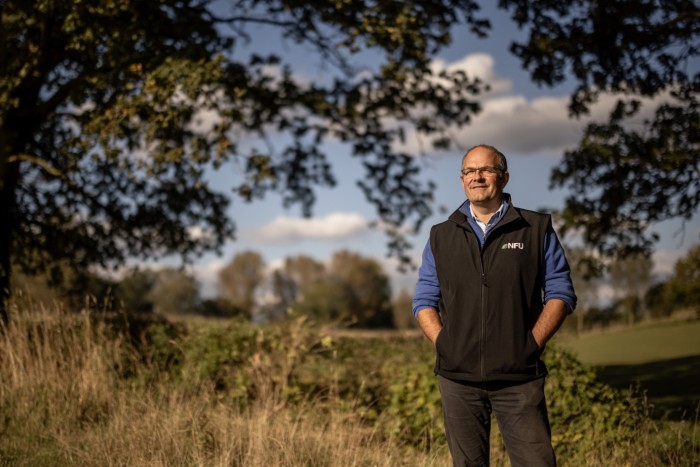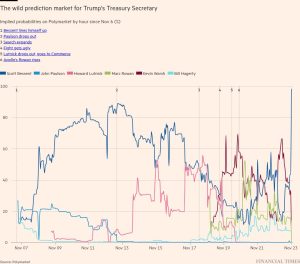UK farmers forced to cut food production to stay viable, warns NFU

Unlock the Editor’s Digest for free
Roula Khalaf, Editor of the FT, selects her favourite stories in this weekly newsletter.
British farmers are scaling back food production in favour of alternatives such as rewilding or growing crops for biofuels to keep their businesses viable, the president of the National Farmers Union has warned.
Major cuts to subsidies for food and consecutive poor harvests are forcing the sector to seek less risky alternatives, Tom Bradshaw said.
“Our members will not go out of business producing people’s food,” he told the Financial Times on his farm in Essex.
Bradshaw, an arable farmer, called on the government ahead of the Budget later this month to roll over the environment department’s £358mn underspend to support farmers with the agricultural transition. Ministers must also urgently distribute grants from a planned flood recovery fund for the worst-hit farms, he said.
“If [the government] don’t get that support package right, if they don’t enable the investment, if they don’t get the planning system working, then ultimately [farmers] will have no choice: they will de-risk their businesses, and we will have lots of birds and bees.”
Record rainfall this year has led to England’s second-worst harvest since modern records began, according to official statistics. This has led to dramatic drops in yields on some crops including English wheat, winter barley and oilseed rape, which fell an estimated 21, 26 and 32 per cent respectively compared with the 2023 harvest.
British farms are also contending with a fall in payments after the UK’s decision to leave the EU. Farmers are facing a 50 per cent cut to their subsidies as the government phases out the EU-era payment scheme.
The UK’s flagship post-Brexit agricultural policy, the Environmental Land Management scheme (ELMS), rewards farmers with payments for improving the natural environment and biodiversity, as well as reducing emissions, while maintaining overall food production.
Bradshaw lamented the fact that the Department for Environment, Food & Rural Affairs (Defra) has never published an impact assessment of ELMS to establish whether the scheme could erode the country’s food self-sufficiency.
In Wales, farmers protested following the conclusions of an assessment of the country’s separate but comparable Sustainable Farming scheme in January. The modelling forecast a 10 per cent cut in Welsh livestock numbers, 5,500 jobs lost and a £199mn hit to farm business income.
“That clarity would really help members because then they can decide if they want to be part of that journey or not,” Bradshaw said. “Right now they are taking the money because they have to.”

The farmer, who was appointed as the trade group’s president in February, said he had had constructive engagement with Labour since they were elected, but slammed their “failure” to deliver the second round of grants from the flood recovery scheme.
He also criticised the lack of clarity over whether the new government would carry forward unspent funds from the last three budgets. The shortfall came about, he said, because of the delayed rollout of the new ELMS payments, which left thousands of farmers without support at a time when they most needed it.
Bradshaw said the shortfall created a dangerous precedent and gave the impression that the farming sector did not need the investment.
“I’m trying desperately not to judge the government until October 30,” he said, in reference to the Budget date. “But for members, it’s getting more and more difficult to have confidence that this government understands them.”
A Defra spokesperson said: “This government will restore stability and confidence in the sector, introducing a new deal for farmers to boost rural economic growth and strengthen food security.
“That starts with accelerating the building of flood defences through our new Flood Resilience Taskforce to protect farms and their crops.”
#farmers #forced #cut #food #production #stay #viable #warns #NFU





